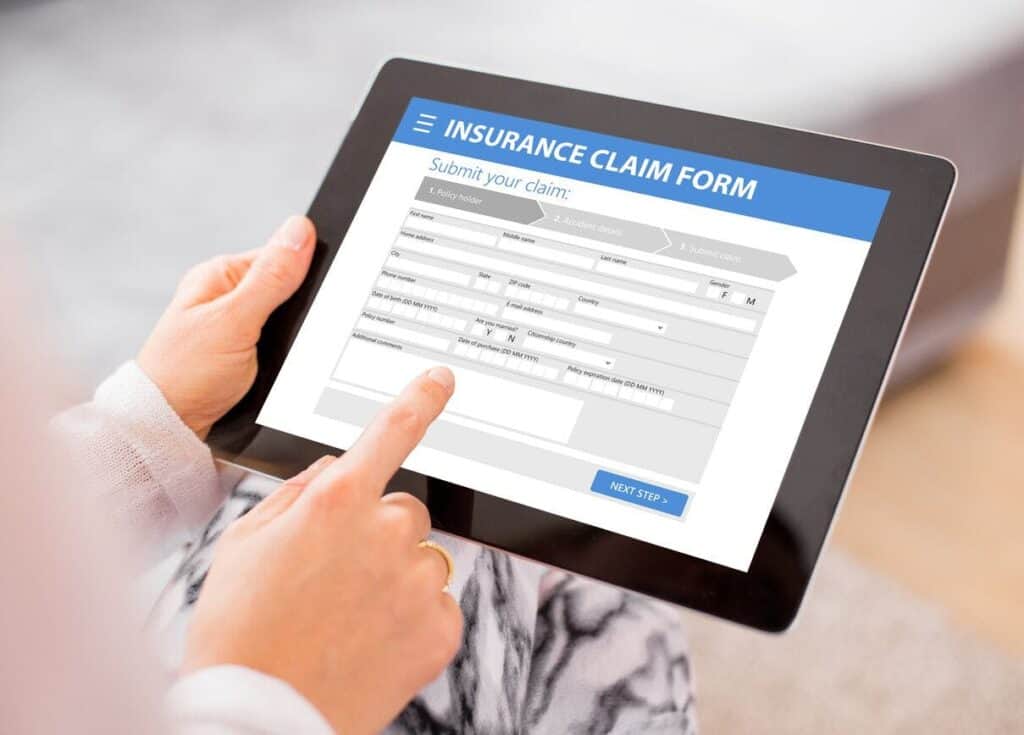
Navigating the process of car accident claims can be tricky. You need to be familiar with the steps involved, from reporting the accident to negotiating with insurance companies who may attempt to minimize liability and payouts. This can be particularly challenging when you’re trying to recover from injuries.
Understanding how car accident claims work and how to receive the compensation you deserve makes dealing with it all much easier. That’s where Stewart J. Guss Injury Lawyers can help. Let’s discuss how car accident claims work, how to gather information and evidence to support your claim, and how we can assist in negotiating fair settlements and representing you in court.
Types of Car Accident Claims
Car accident claims involve the legal process through which you seek compensation for damages caused by a car accident. Claims may be settled through negotiation, but you may need to pursue legal action in some cases.
Some of the most common types of claims include the following:
- Property Damage Claims cover the costs of repairing or replacing your vehicle and any personal property damaged in the accident. This type of claim is essential if the accident resulted in significant damage to your car.
- Personal Injury Claims are filed to seek compensation for injuries sustained in the accident. This includes medical bills, rehabilitation costs, and compensation for pain and suffering. If the injuries affect your ability to work, you may also claim lost wages.
- Uninsured/Underinsured Motorist Claims arise when the at-fault driver lacks sufficient insurance to cover your damages. Here, your own insurance policy steps in to cover the shortfall.
Before Filing a Claim
Gather Evidence
Collecting evidence starts at the accident scene:
- Take photographs of the scene, vehicle damages, and any visible injuries
- Gather contact information from witnesses and other parties involved
- Obtain a police report, as it provides an unbiased account
- Keep medical records if you seek treatment for injuries
- Document all expenses, from vehicle repairs to medical bills, as this information will be vital when proving your claim
Determine Fault
Fault determination involves analyzing the accident’s circumstances. Here’s what you can do:
- Review traffic laws and accident reports
- Collect witness statements that can clarify what happened and who is at fault
- Seek legal advice if required, as a professional can help you understand the nuances of fault in your case
Estimate Damages
Estimating damages involves calculating repair costs, medical expenses, and other financial impacts. Here’s what you need to know:
- Obtain repair estimates from reputable mechanics
- Keep all medical bills and treatment records
- Consider lost wages if your injuries prevent you from working
- Account for long-term impacts like ongoing medical care or reduced earning capacity
- Prepare a comprehensive list to ensure you claim appropriate compensation
Consider Statute of Limitations
The statute of limitations sets a deadline for filing a lawsuit after a car accident. This deadline varies by state and can range from one to six years, with most states having a two or three-year time limit. Keep the following in mind:
- Failing to file a lawsuit within the specified time frame can result in losing your right to seek compensation. Once the statute of limitations expires, you may be barred from pursuing legal action, regardless of the merits of your case.
- The clock for the statute of limitations typically starts ticking from the date of the accident or the date when the injury was discovered, known as the “discovery rule.” However, it’s essential to consult with a legal professional to determine the specific start date based on the circumstances of your case.
- Some situations may warrant exceptions or extensions to the statute of limitations. For instance, if the injured party is a minor or the defendant leaves the state, the claim filing deadline may be extended. Additionally, in cases of delayed discovery of injuries, the statute of limitations may be extended from the date of discovery.

The Claims Process
The first step in the claims process is to contact your insurance company as soon as possible after the accident. Provide all necessary details, including:
- Date, time, and location of the accident
- Personal information of all involved parties
- A thorough description of the accident
You will likely need to complete a claims form. Be prepared to submit supporting documents such as photos, police reports, and any medical reports if there are injuries. Clear communication is essential; providing as much detail as possible can help streamline the process.
Once you file the claim, your insurance company will investigate and verify the details.
An adjuster will review the following:
- Accident reports
- Witness statements
- Physical damages
They may inspect your vehicle and assess repair costs. Cooperation from your side can expedite this phase, as the accuracy of your initial report and the supporting documents you provide will play a significant role in determining the outcome of your claim.
Dealing with Insurance Companies
When dealing with insurance companies after a car accident, it’s crucial to understand your policy, interact wisely with insurance adjusters, and know your dispute resolution options if disagreements arise.
Understanding Your Policy
Your car insurance policy outlines your coverage limits, deductibles, and specific exclusions. Here’s what you need to know:
- Comprehensive and collision coverage usually address vehicle damages, while liability covers damages to others
- Familiarize yourself with terms like personal injury protection (PIP) and uninsured motorist coverage
- Reviewing your summary of benefits can clarify what expenses you’ll need to pay out-of-pocket versus what the insurance will cover
Insurance Adjusters
Insurance adjusters evaluate your claim to determine the extent of damage and appropriate payout. Their goal is to keep the payout minimal while complying with policy terms, so keep the following in mind:
- It’s crucial to provide thorough documentation, including photos and repair estimates
- Be honest, yet cautious, in your communication
- Adjusters may contact witnesses or review police reports to verify your account
- Always request written confirmation for any settlement offers
Dispute Resolution Options
If disagreements with the insurance company arise, you have several options:
- Mediation involves a neutral third party aiding negotiation
- Arbitration is a more formal process where an arbitrator makes a binding decision
- For unresolved issues, small claims court might be necessary

Comparing Settling vs. Going to Court
Settling a Car Accident Claim Outside of Court
Pros:
- Faster Resolution: Settlements often result in quicker resolutions than lengthy court proceedings.
- Certainty: Settlements provide a predictable outcome, as both parties agree on the terms.
- Lower Costs: Avoiding trials can save on legal fees, court costs, and other expenses.
- Privacy: Settlements are private agreements, whereas trials are public proceedings.
- Control: Parties have more control over the outcome and terms of the settlement.
Cons:
- Potential for Lower Compensation: The settlement amount may be lower than what could be awarded in court.
- Limited Appeal Options: There is limited room for appeal or modification once a settlement is agreed upon.
- Negotiation Challenges: Negotiating a fair settlement can be challenging, especially if parties have differing perspectives on liability or damages.
Going to Trial for a Car Accident Claim
Pros:
- Potentially Higher Compensation: Courts may award higher compensation, especially in severe injuries or clear liability cases.
- Legal Protections: Court proceedings provide legal protections and opportunities for thoroughly examining evidence.
- Precedent: Court decisions can set legal precedents that may benefit future cases.
- Appeal Options: Parties have the right to appeal decisions if they believe there were legal errors.
Cons:
- Lengthy Process: Trials can be lengthy, involving court appearances, legal procedures, and waiting for judgments.
- Higher Costs: Trials often incur higher legal fees, court costs, and expenses related to expert witnesses and evidence presentation.
- Uncertain Outcome: Court decisions are unpredictable, and there’s always a risk of losing the case or receiving a lower award than expected.
- Publicity: Trials are public proceedings, which may not be desirable for some parties seeking privacy.
The Litigation Process
Taking your claim to court involves the following:
- Filing a Lawsuit: Your attorney will file a lawsuit on your behalf. This initiates the legal process.
- Discovery Phase: Both sides exchange information and evidence. This could include depositions, interrogatories, and document requests.
- Pre-Trial Motions: Attorneys may file motions to resolve the case or limit the issues for trial.
- Settlement Talks: Settlement negotiations can continue even during litigation and often result in an agreement before trial.
What Compensation Can I Get For a Car Accident Claim?
Types of compensation include the following:
- Medical Expenses: This includes costs for emergency care, hospitalization, surgeries, medication, rehabilitation, and ongoing medical treatment related to the accident.
- Lost Income: If the accident causes you to miss work or affects your ability to earn income, you may be entitled to compensation for lost wages and future earning capacity.
- Property Damage: Compensation can cover repairing or replacing your vehicle and any other property damaged in the accident.
- Pain and Suffering: Non-economic damages such as physical pain, emotional distress, loss of enjoyment of life, and mental anguish may also be included in compensation.
- Permanent Disability or Disfigurement: If the accident results in a permanent disability, impairment, or disfigurement, you may receive compensation for impacting your quality of life and future opportunities.
However, it’s imperative to be aware of the following influencing factors:
- Severity of Injuries: The extent and severity of your injuries significantly determine the compensation amount. Serious injuries that lead to long-term consequences generally result in higher compensation.
- Liability: Establishing fault or liability is crucial. You may be entitled to full compensation if the other party is clearly at fault for the accident. However, compensation may be adjusted based on comparative negligence laws in cases of shared fault.
- Insurance Coverage: The insurance policies of both parties involved, including liability coverage, uninsured/underinsured motorist coverage, and personal injury protection (PIP), impact the available compensation.
- Legal Representation: Having an experienced car accident attorney can significantly impact the outcome of your claim. They can negotiate on your behalf, gather evidence, assess damages, and advocate for fair compensation.
What is Subrogation in Car Accident Claims?
Subrogation in car accident claims refers to a legal process where an insurance company steps into the shoes of its policyholder to recover the money it has paid out on a claim.
Here are key points to know about subrogation:
- Subrogation allows an insurance company to pursue reimbursement for the payments it made to its insured for damages caused by a third-party
- After an insurance company compensates its policyholder for car accident damages, it has the right to seek compensation from the at-fault party or their insurance company
- The primary goal of subrogation is to prevent the policyholder from double recovery, ensuring that they are not compensated twice for the same damages
- Subrogation can occur in various situations, such as property damage, medical expenses, and other losses covered under the insurance policy
- Subrogation often involves legal proceedings where the insurance company pursues the at-fault party or their insurer to recover the money paid out to the policyholder
- Subrogation can affect the overall compensation claimants receive, and the resolution of their car accident claims
How Stewart J. Guss Injury Lawyers Can Help
Navigating the aftermath of a car accident can be overwhelming, with medical bills, vehicle repairs, and insurance negotiations adding stress to an already challenging situation. At Stewart J. Guss Injury Lawyers, we understand the complexities of car accident claims and are here to guide you through every step of the process.
Our goal is to build a strong case on your behalf and negotiate with insurance companies to secure a fair settlement. We have a deep understanding of insurance policies and the tactics insurance companies use to minimize payouts, so we leverage this knowledge to advocate fiercely for your rights and ensure that you are not taken advantage of during the claims process. Whether through negotiation or litigation, we are prepared to fight for the best possible outcome for you.
Trust Guss to stand by your side and fight for justice. Book a case consultation with us today and take the first step towards a brighter future.
Back to BlogGet a Free Consultation
 2 minute response
2 minute response 24 hours a day, 7 Days a Week
24 hours a day, 7 Days a Week Dedicated Trust Guss Intake Team
Dedicated Trust Guss Intake Team
"*" indicates required fields

